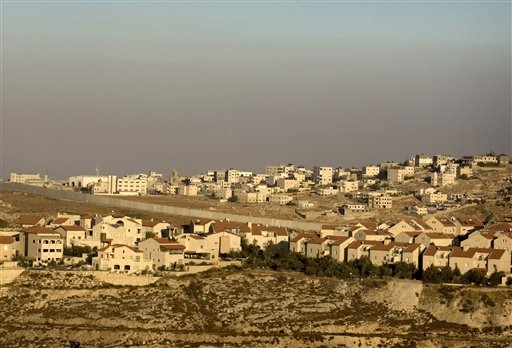
JERUSALEM (AP) — JERUSALEM (AP) — Israel said Tuesday that it was pushing forward with construction of more than 1,200 new homes in Jewish settlements, in an apparent warning to the Palestinians to rethink their plan to ask the United Nations to recognize an independent state of Palestine.
The government announced late Monday that it was accepting bids from contractors to build the homes in two Jewish enclaves in east Jerusalem, Ramot and Pisgat Zeev. The homes are among 1,200 whose construction Israel ordered fast-tracked in November 2011 after a key U.N. body granted full membership to Palestine.
While construction would take months to begin, officials indicated that the timing of the tenders was meant to signal to the Palestinians that they should consider the possible consequences of their plan to ask the U.N. General Assembly later this month to upgrade their status to non-member observer state.
Asked whether this was a sign of what could come, an Israeli official said if the Palestinians go to the General Assembly it would be a "blow to peace" and cause problems. He spoke on condition of anonymity because he wasn't authorized to discuss the matter with reporters.
Senior Palestinian official Saeb Erekat condemned the Israeli action and urged the U.S. to pressure Israel to halt settlement construction.
"What you need to stop is not the Palestinian efforts at the U.N.," he said. "What you need to stop are these settlement activities that are destroying and undermining the possibility of a two-state solution."
Earlier this week, Prime Minister Benjamin Netanyahu urged Palestinian President Mahmoud Abbas to resume negotiations without preconditions. "Peace may be advanced only around the negotiating table and not via unilateral decisions in the U.N. General Assembly, which will only push peace further away and will only lead to instability," Netanyahu said.
Netanyahu met with his Security Cabinet on Tuesday to discuss possible responses to the U.N. bid. There was no word on any decisions. Following last year's move by the Palestinians to join the U.N. cultural agency UNESCO, Israel retaliated by accelerating settlement construction and withholding funds from the Palestinian government. The United States also withheld money to the Palestinians, and Congress has threatened similar sanctions if the Palestinians proceed at the UN again.
The Palestinians say the appeal to the United Nations is not designed to replace peace talks, which broke down four years ago. They argue that with talks stalled, they have to look for other ways to push their claims to establish a state in the West Bank, east Jerusalem and Gaza Strip.
The 193-member General Assembly is dominated by countries sympathetic to the Palestinian cause and the petition for a status upgrade is assured. Last year, the Palestinians failed to receive the necessary U.N. Security Council support for their bid to become a full member state.
Palestinians demand an end to all construction in Israeli settlements before peace talks can resume, reasoning that the expanding settler population is making it impossible to establish a functional Palestinian state.
Abbas has signaled he might try to restart talks after the coming U.N. vote.
Israel rejects any conditions to talks and insists the settlements issue will be resolved when borders are defined through negotiations. Unlike the Palestinians and the rest of the international community, it claims annexed east Jerusalem as part of its capital and does not consider the Jewish areas there to be settlements.
More than 500,000 Israelis have moved to the West Bank and east Jerusalem since Israel capturing those territories and Gaza in 1967. Israel withdrew soldiers and settlers from Gaza in 2005, but still controls access by air, sea and land, except for a crossing between Gaza and Egypt.